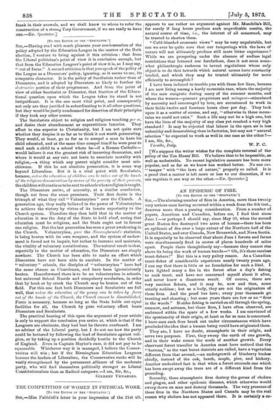[TO THE EDITOR OF THE "SPECTATOR.") SIR,—Having read with much
pleasure your condemnation of the policy adopted by the Education League in the matter of the Bath election, I venture to bring against it this criticism : that from the Liberal politician's point of view it is conclusive enough, but that from the Education Leaguer's point of view it is, as I may say, "out of focus." A second criticism is that you speak of the policy of the League as a Dissenters' policy, ignoring, as it seems to me, its composite character. It is the policy of Secdlarists rather than of Dissenters, and is adopted by Dissenters as likely to further the destructive portion of their programme. And from the point of view of either Secularist or Dissenter, that fraction of the Educa- tional question upon which the League takes its stand is not insignificant. It is the one most vital point, and consequently not only are they justified in subordinating to it all other questions,
but they would be justly condemned for desertion of their principles if they took any other course.
The Secularists object to religion and religious teaching per se, and desire their abandonment as superstitious luxuries. They affect to rise superior to Christianity, but I am not quite sure whether they despise it so far as to think it not worth persecuting. They would, at least, go so far as to compel a man to have his child educated, and at the same time compel him if he were poor to send such a child to a school where be—if a Roman Catholic— would believe it ran the greatest risk of incurring damnation, and where it would at any rate not learn to associate morality with religion,—a thing which any parent might consider most mis- chievous. If this be not absolute persecution, it is some way beyond Liberalism. But it is a vital point with Secularists, because, unless the education of children can be taken out of the hands of the religious denominations by means of the poverty of their parents, the children will continue to be sent to schools wherereligion is taught.
The Dissenters arrive, of necessity, at a similar conclusion, though not from the same premisses. Their first desire is the triumph of what they call " Voluntaryism " over the Church. A generation ago, they really believed in the power of Voluntaryism to achieve the victory by virtue of its innate superiority to the Church system. Therefore they then held that in the matter of education it was the duty of the State to hold aloof, seeing that education must be religious, and the State ought not to favour one religion. But the last generation has seen a great awakening in the Church. Voluntaryism, pace the Nonconformist's statistics, is being beaten with its own weapons, and the system of endow- ment is found not to impair, but rather to increase and maintain, the vitality of voluntary contributions. The natural result is that, especially in the matter of education, the Dissenters are simply nowhere. The Church has been able to make an effort which Dissenters have not been able to emulate. In the matter of " voluntary " schools, the disciples of " voluntaryism " have had the same chance as Churchmen, and have been ignominiously beaten. Henceforward there is to be no voluntaryism in schools, but universal School Boards and compulsory secularism, in order that by hook or by crook the Church may be beaten out of the field. For this one fact both Dissenters and Secularists see full well, that unless the education of the young can be taken by force out of the hands of the Church, the Church cannot be disestablished. Force is necessary, because so long as the State holds out equal facilities for all, the Church by pure volantary effort beats Dissenters and Secularists.
The practical bearing of this upon the argument of your article
is only to support the conclusion you arrive at, which is that if the Leaguers are obstinate, they had beat be thrown overboard. I am no adviser of the Liberal party, but I do not see bow the party could be bettered by following the lead of Secularists against reli- gion, or by taking up a position decidedly hostile to the Church of England. Even in Captain Hayter's case, it did not pay to be squeezable. Whichever way it is managed, I believe the Conser- vatives will win ; but if the Birmingham Education Leaguers become the leaders of Liberalism, the Conservative ranks will be vastly strengthened by the permanent Alliance of the moderate party, who will find themselves politically stronger as Liberal Constitutionalists than as Radical catapaws.—I am, Sir, &c.,
GILBERT VENABLES.


































 Previous page
Previous page